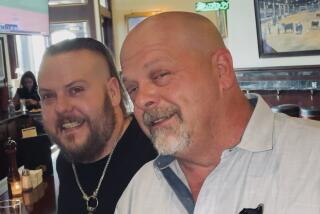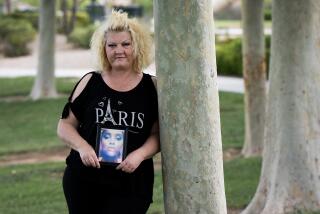Murder Defense Points Finger at Two Others : Crime: David Scott Harrison’s attorney says in opening statement that slain woman’s husband, father both are more suspect than his client.
- Share via
The defense attorney for accused murderer David Scott Harrison argued in his opening statement Tuesday that there are more likely suspects in the 1988 killing of Harrison’s ex-wife, including the victim’s husband at the time.
“It is true David Harrison was unhappy” with victim Anne Jenkins because of a battle with her over visitation rights of their two children, attorney Alan May said.
Turning his gaze from Superior Court Judge David B. Moon Jr., who is hearing the trial without a jury, to the victim’s husband, who was sitting in the first row of the courtroom, May added:
“But evidence will show that Gary Jenkins had motive, opportunity and the means to kill his wife. . . . Gary Jenkins was the last person to see her alive, supposedly, and the first person to see her body, supposedly.”
Furthermore, May argued, there was blood on the telephone used by Jenkins when he discovered his wife’s body and called 911, even though Jenkins testified during Harrison’s preliminary hearing that he didn’t touch his wife’s body.
May added that Anne Jenkins’ father, Harry Wanket, can also be considered more of a suspect than Harrison. May cited the testimony of a witness to the county grand jury that he had overheard Anne Jenkins telling a man in front of her San Marcos home minutes before she was killed, “We don’t need your money anymore.”
That remark, May argued, was apparently intended for Wanket, who had employed his daughter at his construction company. She quit the job four days before she was killed on Feb. 17, 1988, a month after she and Jenkins won $727,000 in the state lottery.
If Harrison were still angry with his former wife over their protracted custody battle, May said, he could have simply abducted the two children during the three days he had them in his custody the weekend before her death.
Given that there was no forcible entry into Anne Jenkins’ home the day of the killing, and given that Harrison “is the last person she’d let in the house, it must have been someone she trusted,” May said, again looking toward where Wanket and Jenkins were sitting.
May contended that the prosecution of Harrison was like “trying to fit a square peg into a round hole.” No evidence puts Harrison at the scene, May said; rather, “you’ll hear plenty (of testimony) poisoning your mind about why they want him there,” he told the judge.
Prosecutor Larry Burns alleged that Harrison carefully planned the killing by, among other things, studying a virtual “catalogue of murder methods” in various books he owned describing how to commit “the perfect murder.”
The lack of forensic evidence linking Harrison to the scene is consistent with the very books he was reading, Burns said. Anne Jenkins’ murder was the final act against Harrison’s ex-wife and was preceded by a three-year harassment campaign he directed at the Jenkinses and Wanket because he was bitter that Anne Jenkins’ new husband and father were helping her finance her court battles against him, according to the prosecutor.
Witnesses will testify, Burns said, that Harrison spoke angrily toward Anne Jenkins--even more so after she and her new husband won the lottery.
Prosecution witness Todd Neumann testified Tuesday that, during a 10-month relationship he had with Harrison, Harrison remarked to him, “It would have been cheaper to kill (her) than to divorce her.”
More to Read
Sign up for Essential California
The most important California stories and recommendations in your inbox every morning.
You may occasionally receive promotional content from the Los Angeles Times.












